.gif)
The City School (Sheffield)
Encyclopedia
The City School, Stradbroke Road, Sheffield
, South Yorkshire
, England
, was formerly known as City Grammar School (which operated from 1964 to 1969 at the present site, and before that at premises in the city centre). The school is a specialist Business and Enterprise College
.
In its Ofsted
report of June 2008, The City School was described as a large community
comprehensive school
situated on the outskirts of Sheffield. The age range was 11 to 16, there were
1,481 pupils on roll.
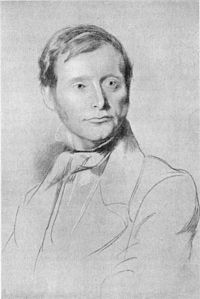 The Elementary Education Act 1870
The Elementary Education Act 1870
, commonly known as Forster's Education Act, set the framework for schooling of all children between the ages of 5 and 13 in England and Wales and established local School Boards
. The main function of these bodies was to use local rates (taxes) to finance the building of schools in cases where the range of existing establishments was inadequate. A driving force behind the Act was a perceived need for Britain to remain competitive in the world by being at the forefront of manufacture and improvement. The only existing formal education until this time had been in Church schools and some ragged school
s for the poor. Between 1870 and 1880, 3,000–4,000 schools were started or taken over by school boards.
The resulting new schools consequently required larger numbers of teachers. Furthermore, higher standards of educational attainment came to be expected in schools, so the quality of the teachers also needed to be raised. It became necessary, therefore, to develop efficient and affordable methods of improving the standards of teacher training. The solution adopted, along the 1870s, 80s and 90s, was the education of "pupil teachers" for a four-year period (14–18 years of age) in specific training Centres.
History and Memories of S.P.T.C. through to C.G.S.
In Sheffield, the number of such Centres peaked at 11 establishments in the period 1881 to 1884, but it was later decided that the system would become more efficient with the centralisation of teacher training activities of this type in just one Centre. In 1894 the School Board purchased the premises formerly occupied by the old Free Writing School in School Croft, in the city centre, and in February of that year Mr. J. G. Picknet became head of the "Central Higher School". Two years later it was decided that this old building should be scheduled for demolition and that a new Centre should be constructed at a nearby site at the corner of Orchard Lane and Holly Street.
The new Sheffield Pupil Teacher Centre building was inaugurated on 9 October 1899 by Spencer Cavendish, 8th Duke of Devonshire
. An Alumni Association, the "Holly Guild" was formed around 1904 and the first official number of the school magazine "The Holly Leaf: A Chronicle of the Sheffield City Grammar School" was printed in 1907 (up to this time it had been distributed in handwritten format).
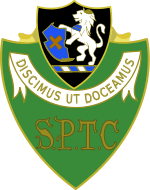 Pupil numbers declined from 376 in 1906 to 143 in 1912, but subsequent rapid increases in the period 1915 to 1920
Pupil numbers declined from 376 in 1906 to 143 in 1912, but subsequent rapid increases in the period 1915 to 1920
led to the necessity to contract thirteen additional members of staff and classes also had to be held at other
premises at Carver Street, Townhead Street, Arundel Street (College of Arts and Crafts) and the Central School in
addition to the Centre itself. In 1922 the Centre implemented an annual admission of four forms of boys and girls who had qualified via the 11 plus examination
, and it effectively became a Secondary School.
You Will Have A New Building Soon - written 1963 by Stephen Northeast - former Headmaster
The idea of pupil-teachership lost support over the following two decades and Sheffield was one of the last two surviving urban authorities to maintain a Centre of this type. (The system was eventually discontinued in the city in 1944). The SPTC moved into premises at Orchard Lane on 11 September 1933 and changed its name to the City Secondary School shortly after the appointment of the new Head Master, Mr Northeast, in 1935. In 1941 it was again renamed, becoming City Grammar School.
The United Kingdom's secondary education
structure was organised according to the Tripartite System
between the 1944 Butler Education Act
and 1976. This was known colloquially as the grammar school system. Secondary schools were divided into three categories, Grammar schools, Technical schools
and Secondary Modern School
s. Pupils allocated to each according to their performance in the Eleven Plus examination.
The new Sheffield City Grammar School adopted the Phoenix
as its symbol and maintained the traditional SPTC school song "Carmen Ilicis", composed by Edward H. Taylor L.R.A.M. (music) and Alan W. Goodfellow, M.A. (lyrics), the first verse and chorus of which are:
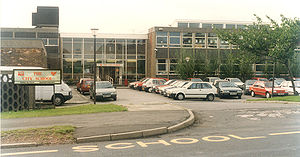 The Oak, the Ash, the bonny Ivy tree
The Oak, the Ash, the bonny Ivy tree
Are known in story, famed in song ;
But we who know thee, certain are
That, search the woodland near or far,
Ye ne'er will find, tho' seek ye long,
A bush so worthy song or eulogy
As Centre's Holly - ever green.
Semper discamus
Ut doceamus
Nil nisi verum, nil nisi verum.
Sive docemur,
Sive docemus,
Vitam degamus
Ut maneamus
Omnes amici, omnes amici !
A reporter, writing about the City Grammar School
in "Yorkshire Life" magazine, in 1960 commented, "... to me it is one of the city's most interesting schools ... it was co-educational at a time when it was considered revolutionary for the sexes to mingle in class ... there is a solid, down-to-earth atmosphere about it that fits the character of the city, and its pupils have the friendliness and assurance one expects from Sheffield's hard-working, self-respecting citizens ... ".
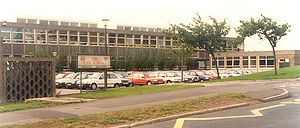 CGS continued at the city centre site until 19 February 1964 when the first assembly was held for the 760 pupils at the newly-completed, £300,000, Stradbroke Road premises. (Sheffield City Council data for 1959/60 had evaluated the cost of the Orchard Lane buildings and furniture, at that time, to be £80,121 14s. 3d.).
CGS continued at the city centre site until 19 February 1964 when the first assembly was held for the 760 pupils at the newly-completed, £300,000, Stradbroke Road premises. (Sheffield City Council data for 1959/60 had evaluated the cost of the Orchard Lane buildings and furniture, at that time, to be £80,121 14s. 3d.).
The April 1969, Spring Edition of the Holly Leaf carried an editorial which began with "NOTICE IS HEREBY GIVEN...that the City Council of Sheffield propose to re-organise, from September 1969, the City Grammar School to form a co-educational comprehensive school." It continued, regarding the choice of a name for the new institute; "For a time we looked like becoming Bashforth School...good sense and the persistent efforts of the Head-master prevailed, and September will see the creation of City School." The editorial finishes; "Good luck, City School."
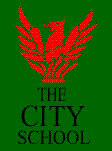 The current City School is designated a "specialist business and enterprise college" and has a staff of around
The current City School is designated a "specialist business and enterprise college" and has a staff of around
130 to teach the almost 1,500, 11–16 year old pupils. The school maintained the traditional red Phoenix on a green
background as its logo until 2009. Mr. David Lack took over as a temporary Headteacher from Ms. Julie Warne after Easter 2007. Mr. S.H.Roberts B.A. is the Deputy Headteacher, and Mr. Ken Dunn BSc (Royal Geographical Society's Teacher of the Year) is an Assistant Headteacher.
In 2007 the school was put into 'Special Measures' by OFSTED, however following an inspection on 11 June 2008, the school was taken out of 'Special Measures' and jumped up two grades and is now a 'Satisfactory School'.
In August 2008 the school achieved its highest ever GCSE results, surpassing its previous record set in 2007.
Sheffield
Sheffield is a city and metropolitan borough of South Yorkshire, England. Its name derives from the River Sheaf, which runs through the city. Historically a part of the West Riding of Yorkshire, and with some of its southern suburbs annexed from Derbyshire, the city has grown from its largely...
, South Yorkshire
South Yorkshire
South Yorkshire is a metropolitan county in the Yorkshire and the Humber region of England. It has a population of 1.29 million. It consists of four metropolitan boroughs: Barnsley, Doncaster, Rotherham, and City of Sheffield...
, England
England
England is a country that is part of the United Kingdom. It shares land borders with Scotland to the north and Wales to the west; the Irish Sea is to the north west, the Celtic Sea to the south west, with the North Sea to the east and the English Channel to the south separating it from continental...
, was formerly known as City Grammar School (which operated from 1964 to 1969 at the present site, and before that at premises in the city centre). The school is a specialist Business and Enterprise College
Business and Enterprise College
Business and Enterprise Colleges were introduced in 2002 as part of the Specialist Schools Programme in the United Kingdom. The system enables secondary schools to specialise in certain fields...
.
In its Ofsted
Ofsted
The Office for Standards in Education, Children's Services and Skills is the non-ministerial government department of Her Majesty's Chief Inspector of Schools In England ....
report of June 2008, The City School was described as a large community
Community school
The term "community school" refers to types of publicly funded school in England, Wales, the Republic of Ireland, the United States, Australia, Canada and New Zealand to a school that serves as both an educational institution and a centre of community life. A community school is both a place and a...
comprehensive school
Comprehensive school
A comprehensive school is a state school that does not select its intake on the basis of academic achievement or aptitude. This is in contrast to the selective school system, where admission is restricted on the basis of a selection criteria. The term is commonly used in relation to the United...
situated on the outskirts of Sheffield. The age range was 11 to 16, there were
1,481 pupils on roll.
History
Before being renamed as The City School, in 1969, the Stradbroke Road establishment had been (1964–1969) City Grammar School (CGS). CGS itself had previously occupied premises in Sheffield city centre where, until 1941, it had been the Sheffield Pupil Teacher Centre (SPTC). The original institution dates from the 1890s.
Elementary Education Act 1870
The Elementary Education Act 1870, commonly known as Forster's Education Act, set the framework for schooling of all children between ages 5 and 12 in England and Wales...
, commonly known as Forster's Education Act, set the framework for schooling of all children between the ages of 5 and 13 in England and Wales and established local School Boards
School board (England & Wales)
School boards were public bodies in England and Wales between 1870 and 1902, which established and administered elementary schools.School boards were created in boroughs and parishes under the Elementary Education Act 1870 following campaigning by George Dixon, Joseph Chamberlain and the National...
. The main function of these bodies was to use local rates (taxes) to finance the building of schools in cases where the range of existing establishments was inadequate. A driving force behind the Act was a perceived need for Britain to remain competitive in the world by being at the forefront of manufacture and improvement. The only existing formal education until this time had been in Church schools and some ragged school
Ragged school
Ragged Schools were charitable schools dedicated to the free education of destitute children in 19th century England. The schools were developed in working class districts of the rapidly expanding industrial towns...
s for the poor. Between 1870 and 1880, 3,000–4,000 schools were started or taken over by school boards.
The resulting new schools consequently required larger numbers of teachers. Furthermore, higher standards of educational attainment came to be expected in schools, so the quality of the teachers also needed to be raised. It became necessary, therefore, to develop efficient and affordable methods of improving the standards of teacher training. The solution adopted, along the 1870s, 80s and 90s, was the education of "pupil teachers" for a four-year period (14–18 years of age) in specific training Centres.
History and Memories of S.P.T.C. through to C.G.S.
In Sheffield, the number of such Centres peaked at 11 establishments in the period 1881 to 1884, but it was later decided that the system would become more efficient with the centralisation of teacher training activities of this type in just one Centre. In 1894 the School Board purchased the premises formerly occupied by the old Free Writing School in School Croft, in the city centre, and in February of that year Mr. J. G. Picknet became head of the "Central Higher School". Two years later it was decided that this old building should be scheduled for demolition and that a new Centre should be constructed at a nearby site at the corner of Orchard Lane and Holly Street.
The new Sheffield Pupil Teacher Centre building was inaugurated on 9 October 1899 by Spencer Cavendish, 8th Duke of Devonshire
Spencer Cavendish, 8th Duke of Devonshire
Spencer Compton Cavendish, 8th Duke of Devonshire KG, GCVO, PC, PC , styled Lord Cavendish of Keighley between 1834 and 1858 and Marquess of Hartington between 1858 and 1891, was a British statesman...
. An Alumni Association, the "Holly Guild" was formed around 1904 and the first official number of the school magazine "The Holly Leaf: A Chronicle of the Sheffield City Grammar School" was printed in 1907 (up to this time it had been distributed in handwritten format).

led to the necessity to contract thirteen additional members of staff and classes also had to be held at other
premises at Carver Street, Townhead Street, Arundel Street (College of Arts and Crafts) and the Central School in
addition to the Centre itself. In 1922 the Centre implemented an annual admission of four forms of boys and girls who had qualified via the 11 plus examination
Eleven plus
In the United Kingdom, the 11-plus or Eleven plus is an examination administered to some students in their last year of primary education, governing admission to various types of secondary school. The name derives from the age group for secondary entry: 11–12 years...
, and it effectively became a Secondary School.
You Will Have A New Building Soon - written 1963 by Stephen Northeast - former Headmaster
The idea of pupil-teachership lost support over the following two decades and Sheffield was one of the last two surviving urban authorities to maintain a Centre of this type. (The system was eventually discontinued in the city in 1944). The SPTC moved into premises at Orchard Lane on 11 September 1933 and changed its name to the City Secondary School shortly after the appointment of the new Head Master, Mr Northeast, in 1935. In 1941 it was again renamed, becoming City Grammar School.
The United Kingdom's secondary education
Secondary education
Secondary education is the stage of education following primary education. Secondary education includes the final stage of compulsory education and in many countries it is entirely compulsory. The next stage of education is usually college or university...
structure was organised according to the Tripartite System
Tripartite System
The Tripartite System was the arrangement of state funded secondary education between 1944 and the 1970s in England and Wales, and from 1947 to 2009 in Northern Ireland....
between the 1944 Butler Education Act
Education Act 1944
The Education Act 1944 changed the education system for secondary schools in England and Wales. This Act, commonly named after the Conservative politician R.A...
and 1976. This was known colloquially as the grammar school system. Secondary schools were divided into three categories, Grammar schools, Technical schools
Secondary Technical School
A Secondary Technical School was a type of secondary school in the United Kingdom that existed in the mid-20th century under the Tripartite System of education. For various reasons few were ever built, and their main interest is on a theoretical level....
and Secondary Modern School
Secondary modern school
A secondary modern school is a type of secondary school that existed in most of the United Kingdom from 1944 until the early 1970s, under the Tripartite System, and was designed for the majority of pupils - those who do not achieve scores in the top 25% of the eleven plus examination...
s. Pupils allocated to each according to their performance in the Eleven Plus examination.
The new Sheffield City Grammar School adopted the Phoenix
Phoenix (mythology)
The phoenix or phenix is a mythical sacred firebird that can be found in the mythologies of the Arabian, Persians, Greeks, Romans, Egyptians, Chinese, Indian and Phoenicians....
as its symbol and maintained the traditional SPTC school song "Carmen Ilicis", composed by Edward H. Taylor L.R.A.M. (music) and Alan W. Goodfellow, M.A. (lyrics), the first verse and chorus of which are:

Are known in story, famed in song ;
But we who know thee, certain are
That, search the woodland near or far,
Ye ne'er will find, tho' seek ye long,
A bush so worthy song or eulogy
As Centre's Holly - ever green.
Semper discamus
Ut doceamus
Nil nisi verum, nil nisi verum.
Sive docemur,
Sive docemus,
Vitam degamus
Ut maneamus
Omnes amici, omnes amici !
A reporter, writing about the City Grammar School
School
A school is an institution designed for the teaching of students under the direction of teachers. Most countries have systems of formal education, which is commonly compulsory. In these systems, students progress through a series of schools...
in "Yorkshire Life" magazine, in 1960 commented, "... to me it is one of the city's most interesting schools ... it was co-educational at a time when it was considered revolutionary for the sexes to mingle in class ... there is a solid, down-to-earth atmosphere about it that fits the character of the city, and its pupils have the friendliness and assurance one expects from Sheffield's hard-working, self-respecting citizens ... ".

The April 1969, Spring Edition of the Holly Leaf carried an editorial which began with "NOTICE IS HEREBY GIVEN...that the City Council of Sheffield propose to re-organise, from September 1969, the City Grammar School to form a co-educational comprehensive school." It continued, regarding the choice of a name for the new institute; "For a time we looked like becoming Bashforth School...good sense and the persistent efforts of the Head-master prevailed, and September will see the creation of City School." The editorial finishes; "Good luck, City School."

130 to teach the almost 1,500, 11–16 year old pupils. The school maintained the traditional red Phoenix on a green
background as its logo until 2009. Mr. David Lack took over as a temporary Headteacher from Ms. Julie Warne after Easter 2007. Mr. S.H.Roberts B.A. is the Deputy Headteacher, and Mr. Ken Dunn BSc (Royal Geographical Society's Teacher of the Year) is an Assistant Headteacher.
In 2007 the school was put into 'Special Measures' by OFSTED, however following an inspection on 11 June 2008, the school was taken out of 'Special Measures' and jumped up two grades and is now a 'Satisfactory School'.
In August 2008 the school achieved its highest ever GCSE results, surpassing its previous record set in 2007.
Headmasters and Principals (SPTC & CGS)
- 1899 - 1919, Arthur J. Arnold (S.P.T.C)
- 1919 - 1931, Joseph Batey, Principal (S.P.T.C.)
- 1931 - 1934, Alfred Meetham, Principal (S.P.T.C.)
- 1935 - 1950, Stephen Northeast, Headmaster (S.P.T.C./CGS)
- 1950 - 1955, Ronald H. Davies MSc, Headmaster (CGS)
- 1956 - 1970, Lindsay Harvatt MA, Headmaster (CGS)
Headteachers (The City School)
- 1970 - ......, Mr. Hughes, Headteacher
- .... - 1986, Alan Debes
- 1986 - 1999, Ed Gabbani, Headteacher
- 1999 - 2007, Julie Warne, Headteacher
- 2007 - 2008, David Lack, Headteacher
- 2008 - present, Matt Percival, Headteacher
Notable alumni
- Jarvis CockerJarvis CockerJarvis Branson Cocker is an English musician and frontman for the band Pulp. Through his work with the band, Cocker became a figurehead of the Britpop movement of the mid-1990s. Following Pulp's hiatus Cocker has led a successful solo career...
, Musician - Danny WillettDanny WillettDaniel John Willett is an English professional golfer.Willett was born in Sheffield, England. As an amateur, he won the English Amateur Championship in 2007 and competed in the 2007 Walker Cup at Royal County Down. In March 2008 he became the number one ranked amateur in the world.Willett also...
, Golfer - Jamie ReevesJamie ReevesJamie Reeves is a former coal miner, strongman and professional wrestler. As a strongman, he won the 1989 World's Strongest Man, was World Muscle Power champion, and also had numerous other titles including Europe's Strongest Man and Britain's Strongest Man...
(born 3 May 1962), strongmanStrength athleteA strength athlete is a person who trains for or competes in events in which muscular strength and power play a primary role. Such events include weightlifting and powerlifting, strength athletics and strongman competitions, and arm wrestling, as well as the "heavy throws" of track and field:...
and former winner of the title of World's Strongest ManWorld's Strongest ManThe World's Strongest Man is a well recognised event in strength athletics and has been described by a number of highly respected authorities in the sport as the premier event in strongman. Organized by TWI, an IMG Media company, it is broadcast around the end of December each year...
City Grammar School
- James Buckley, chief executive of the Baltic ExchangeBaltic ExchangeThe Baltic Exchange is the world's only independent source of maritime market information for the trading and settlement of physical and derivative contracts...
from 1992-2004 - Bernard Cotton CBE, President of the Yorkshire and Humberside Development Association from 1973-84
- Tim Ellis, Bishop of GranthamBishop of GranthamThe Bishop of Grantham is an episcopal title used by a suffragan bishop of the Church of England Diocese of Lincoln, in the Province of Canterbury, England. The title takes its name after the market town of Grantham in Lincolnshire. The bishop has episcopal oversight as the area bishop for the...
since 2006 - Roy HattersleyRoy HattersleyRoy Sydney George Hattersley, Baron Hattersley is a British Labour politician, author and journalist from Sheffield. He served as Deputy Leader of the Labour Party from 1983 to 1992.-Early life:...
, Labour politician - Jim MarshallJim Marshall (UK politician)James Marshall was a British Labour Party politician.-Education:Marshall was born into a working class family in the Attercliffe district of Sheffield...
Labour MP for Leicester SouthLeicester South (UK Parliament constituency)Leicester South is a borough constituency represented in the House of Commons of the Parliament of the United Kingdom. It elects one Member of Parliament , by the first past the post voting system...
from 1974-83 and 1987-2004 - Sir Peter E. MiddletonPeter MiddletonSir Peter Edward Middleton GCB is a British UK Chairman, Marsh & McLennan Companies, former banker and current Chancellor of the University of Sheffield.-Life:...
GCB - English banker, current Chancellor of the University of SheffieldUniversity of SheffieldThe University of Sheffield is a research university based in the city of Sheffield in South Yorkshire, England. It is one of the original 'red brick' universities and is a member of the Russell Group of leading research intensive universities... - Sir Roger Singleton, chief executive of Barnardo'sBarnardo'sBarnardo's is a British charity founded by Thomas John Barnardo in 1866, to care for vulnerable children and young people. As of 2010, it spends over £190 million each year on more than 400 local services aimed at helping these same groups...
from 1984-2006

